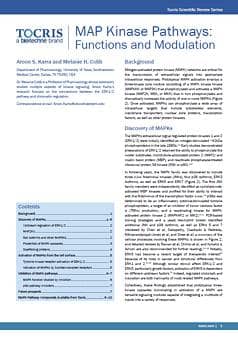JNK/c-Jun
JNKs (c-Jun N-terminal kinases) are a group of mitogen-activated protein kinases (MAPKs), originally called stress activated protein kinases (SAPKs), because they are activated by various environmental stresses. They can also be activated by cytokines and growth factors.
JNK/c-Jun Inhibitors |
|
|---|---|
| Cat. No. | 产品名称/活性 |
| 3314 | BI 78D3 |
| Selective, competitive JNK inhibitor | |
| 1989 | c-JUN peptide |
| Peptide inhibitor of JNK/c-Jun interaction | |
| 6258 | CC 401 dihydrochloride |
| High affinity JNK inhibitor; also inhibits HCMV replication | |
| 4924 | CEP 1347 |
| Inhibitor of JNK signaling | |
| 1496 | SP 600125 |
| Selective JNK inhibitor | |
| 5044 | SR 3576 |
| Highly potent and selective JNK3 inhibitor | |
| 3607 | SU 3327 |
| Selective JNK inhibitor | |
| 2827 | TCS JNK 5a |
| Selective inhibitor of JNK2 and JNK3 | |
| 3222 | TCS JNK 6o |
| Selective JNK inhibitor | |
JNK/c-Jun Activators |
|
| Cat. No. | 产品名称/活性 |
| 1290 | Anisomycin |
| JNK, SAPK and p38 activator | |
Other |
|
| Cat. No. | 产品名称/活性 |
| 6558 | CP 43 |
| Inhibits TAOK activation of JNK | |
JNKs (c-Jun N-terminal kinases) are a group of mitogen-activated protein kinases (MAPKs), originally called stress activated protein kinases (SAPKs), because they are activated by a variety of environmental stresses. They are also activated in response to cytokines such as TNF-α and IL-1, and growth factors.
There are three isoforms of JNK; JNK1, JNK2 and JNK3. JNK1 and JNK2 are ubiquitously expressed, whilst JNK3 expression is limited to the brain, heart and testis. JNK phosphorylates a wide variety of substrates including c-Jun. c-Jun is a component of the AP-1 transcription factor complex and is involved in the control cell proliferation, transformation, survival and death. JNK also phosphorylates p53 and some non-nuclear proteins. JNK-mediated phosphorylation of target proteins is essential for the induction of gene expression of interleukins, VEGF, COX-2, MMP-9, heme oxygenase-1, ICAM-1, NCX1, GnRHR and others.
JNK is critical in processes as divergent as apoptosis, cell survival, proliferation and differentiation. The JNK pathway appears to be involved in inflammatory and autoimmune disorders including rheumatoid arthritis, irritable bowel disease, and atherosclerosis.
External sources of pharmacological information for JNK/c-Jun :
Literature for JNK/c-Jun
Tocris offers the following scientific literature for JNK/c-Jun to showcase our products. We invite you to request* your copy today!
*Please note that Tocris will only send literature to established scientific business / institute addresses.
MAPK Signaling Scientific Review
MAP kinase signaling is integral to the regulation of numerous cellular processes such as proliferation and differentiation, and as a result is an important focus of cancer and immunology research. Updated for 2016, this review discusses the regulation of the MAPK pathway and properties of MAPK cascades. Compounds available from Tocris are listed.
Pathways for JNK/c-Jun
MAPK Signaling Pathway
The mitogen-activated protein kinase pathway evokes an intracellular signaling cascade in response to extracellular stimuli such as heat and stress. It can influence cell division, metabolism and survival.JNK/c-Jun Gene Data
| Gene | Species | Gene Symbol | Gene Accession No. | Protein Accession No. |
|---|---|---|---|---|
| JNK1 | Human | MAPK8 | NM_139047 | P45983 |
| Mouse | Mapk8 | NM_016700 | Q91Y86 | |
| Rat | Mapk8 | XM_341399 | P49185 | |
| JNK2 | Human | MAPK9 | NM_139069 | P45984 |
| Mouse | Mapk9 | NM_016961 | Q9WTU6 | |
| Rat | Mapk9 | NM_017322 | P49186 | |
| JNK3 | Human | MAPK10 | NM_002753 | P53779 |
| Mouse | Mapk10 | NM_009158 | Q61831 | |
| Rat | Mapk10 | NM_012806 | P49187 | |
| c-Jun | Human | JUN | NM_002228 | P05412 |
| Mouse | Jun | NM_010591 | P05627 | |
| Rat | Jun | NM_021835 | P17325 |

